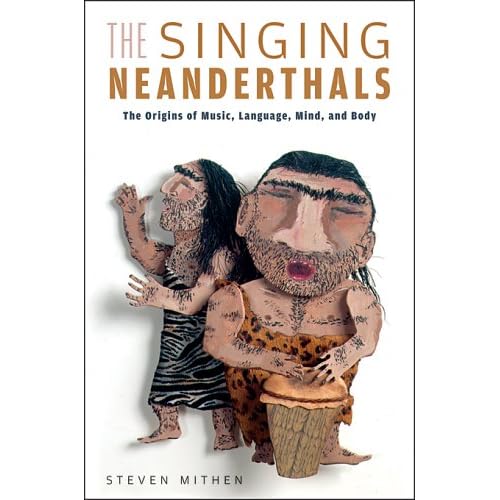Spread around me is my copy of "the Grout," my composition notebook, my new "autodidacticism notebook", and some dusty musty history/theory textbooks from college. I am beginning to research.
I know what I want to do - learn the characteristics of the major eras of Western music (classical music, really), and then compose pieces in that style.
What I'm trying to do is figure out where to begin and how to organize my resources. Where to begin?
Why not Hildegard von Bingen, awesome composer and receiver of divine inspiration that looks sort of like a squid attack? ("touched by his noodly appendage" indeed). I've transcribed a few recordings of her music, she's easy on the ears, and...oh, but wait no. I crack open the Grout, and see that we can go back to humanity's most primitive music-making. Meh, too speculative (although it maybe it would motivate me to get further in The Singing Neanderthals).
Really, what we're searching for is inspiration and motivation to compose. "Amateurs borrow, professionals steal" is a quote I've seen attributed to Stravinsky (among others). We're looking for things that we can rip out and use as constraints when composing, and thus gain an understanding of music history that is much deeper than what we would get by just reading about it.
The first section of the Grout to have anything we can use like this is "Greek Musical Thought." (pg. 12...of 986 total). Here we have our old friends Plato and Aristotle writing about how music can affect one's mood or ethos (duh? Any farmer could have told you there's music that makes you want to dance and music that makes babies want to sleep. One thing I hope to do with this blog is dig into the primary sources and see if Aristotle and Plato were merely trying to document this, as most texts I've read imply, or if their actual intent was to proscribe what people should listen to, which seems much more likely).
But then we get to what we're looking for - early theoretical works by Aristoxenus and Cleonides. A GoogleBooks search turns up not QUITE the primary texts, but many books that explain the texts (including one book that says the primary sources are pretty unintelligible anyway).
Ok, this is where we can start. So my next task is to visit 300 BC-ish Greek music theory and put together the key concepts and perhaps even some constraints for compositions (scales--excuse me, "modes"--and such would probably be a good place to start.)
My routine will be, roughly:
- Research this stuff over the weekend
- Come up with a composition assignment
- Compose during the week
As such, this blog will include:
- Sketches and attempts to compose using the the idioms of various eras
- Corresponding composition challenges, for those who want to play along at home
- Hopefully audio files of others' attempts to composing in the same style (wouldn't that be fun?!)
- Some light armchair musicology
- Some light history (nothing to make an academic's head spin, but hopefully enough to blow the average person's mind)
Resources for Early Greek Music:
- THE music history textbook: A History of Music (aka "The Grout")
- Good old Wikipedia
- Awesomely, Spotify (man, I love the internet SO MUCH! Here's a Spotify playlist I made: Ancient Greek Music
- GoogleBooks (note the new dialog box that asks, "Researching A Topic?" Why YES I AM!)
My next post will contain some characteristics of early Greek music, and some thoughts on how it can inspire some compositions right now. Onward!





No comments:
Post a Comment